Every Korean New Year’s day, we make Tteok Guk/Dduk Guk (떡국) and share it with our family and guests who visit our homes. During the New Year holiday, many Koreans travel back to their hometown. They visit their parents and elderly relatives to pay their respects by bowing (Saebae 세배) to them, wishing them health and good fortune. Children receive blessings and words of wisdom from the elders, as well as monetary gifts called Saebaedon (세배돈).
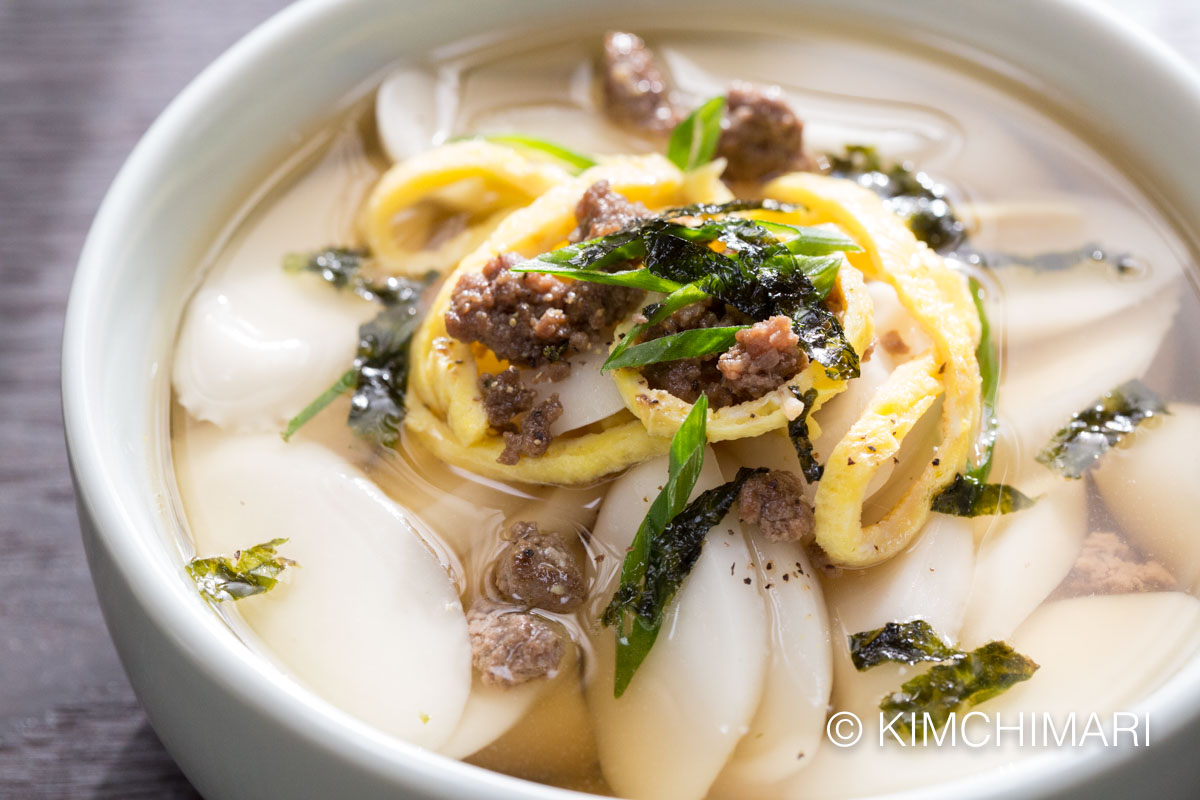
This was my favorite time of the year because it meant that if I did good, I would have enough money to buy myself goodies throughout the whole year! (or at least until my birthday in summer.. ) Oh, but there was something that I did not like – we all had to wear traditional Korean clothes (Hanbok 한복) all day and they were pretty but quite uncomfortable. The traditional way to wear hanbok is to wrap the skirt around your chest and tie it very, very tight. I mean really tight.. so tight I thought I was going to die because I couldn’t breathe!
Why do Koreans eat Tteokguk (rice cake soup) for New Year’s?
No one knows for sure exactly why Korean Rice Cake Soup (Tteok Guk) became a traditional Korean food to eat at home on New Year’s day. Theory 1: Because rice was harvested in the fall and in the old days there were no means of storing it long-term, making rice cake was a way of using up old rice.
Theory 2: Based on customary beliefs, it has to do with yin and yang and that New Year’s day represents the yang (positive) energy and also so does the rice cake. Don’t ask me why exactly rice cake represents yang energy…
With the earliest records of tteokguk dating back to the Joseon dynasty, the origins of Tteokguk tteok (rice cake ovalettes) and Garaetteok 가래떡- from which the round oval rice cakes are cut from- are very interesting. It is said that the ‘white’ color of the rice cakes symbolized ‘brightness’, for a bright and clean start to a New Year. The round shape of the rice cakes also represented the sun and the long continuing baton like shape of Garaetteok represents ‘continued wealth’. As well as the round disc like shapes being similar to old Korean coins – again symbolizing wealth.
Long time ago, the stock for the rice cake soup was made from pheasant meat. In more modern times, beef stock has become the standard. You can also use anchovy stock or chicken stock. Anchovy stock is not as rich tasting as beef stock but it is easier, quicker and has a cleaner taste. It is also lower in calories, so I like using anchovy stock for everyday Tteokguk.
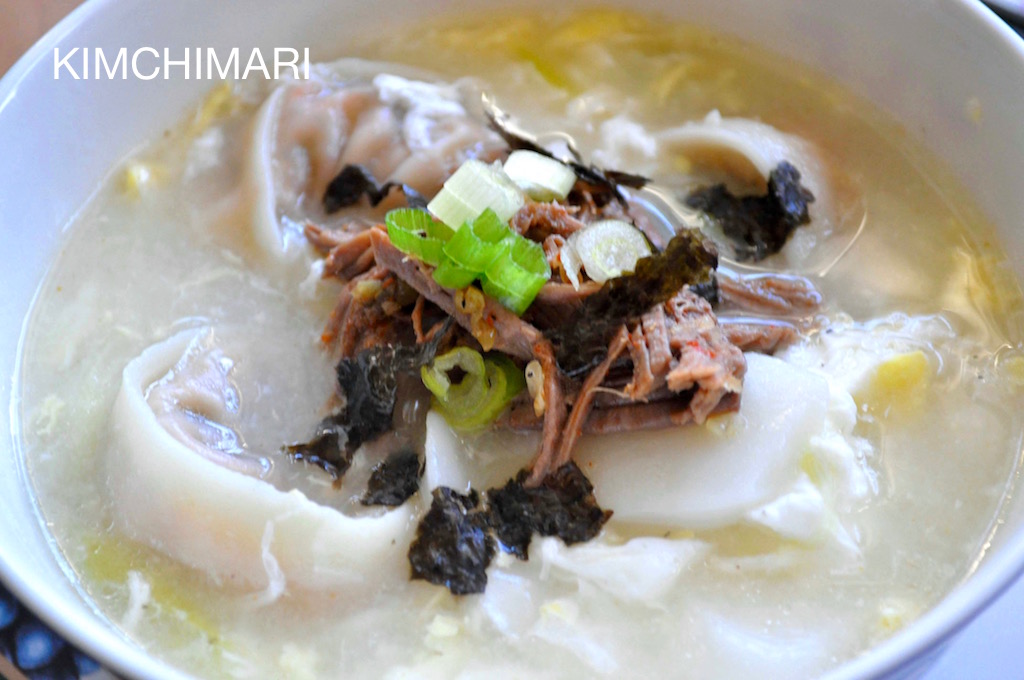
Korean Rice Cake and Dumpling Soup in Beef Broth (Tteok Mandoo Guk 떡만두국)
OK enough talk.. let’s start cooking!
RICE CAKE SOUP – TTEOK GUK/DDUK GUK RECIPE
Prep Time: 10 min. Cooking Time: 35 min. Servings: 4
Ingredients for anchovy stock Dduk Guk/Tteok Guk
- 1 lb rice cake slices/ovalettes for soup (떡국떡 Tteokguk tteok)
- 8 C anchovy stock (see my tips page for making anchovy stock)
- 2 green onions
- 1/2 sliced onion (optional)
- 1 julienned carrot (optional)
- 1 T chopped garlic
- 1 T gook kanjang (국간장)
- 1/2 tsp salt
- black pepper
For garnish:
- toasted seaweed (gim 김) crumbles or strips
- 1 green onion, sliced
- 2 eggs
- 1 tsp oil for frying
- 1/2 lb beef stew meat/brisket or ground beef (optional)
- seasoning for the beef:
- 4 tsp soy sauce (Kikkoman)
- 4 tsp sugar
- 1 T rice cooking wine
- 1 T sesame oil
- 1 T minced garlic
- 1/2 tsp ground black pepper
Directions
1. Prepare the anchovy stock. Read my 4 Anchovy Broth Recipes page on how to make anchovy stock.
2. Rinse and soak rice cake in cold water (especially if the rice cake is frozen) for 5 to 10 minutes.
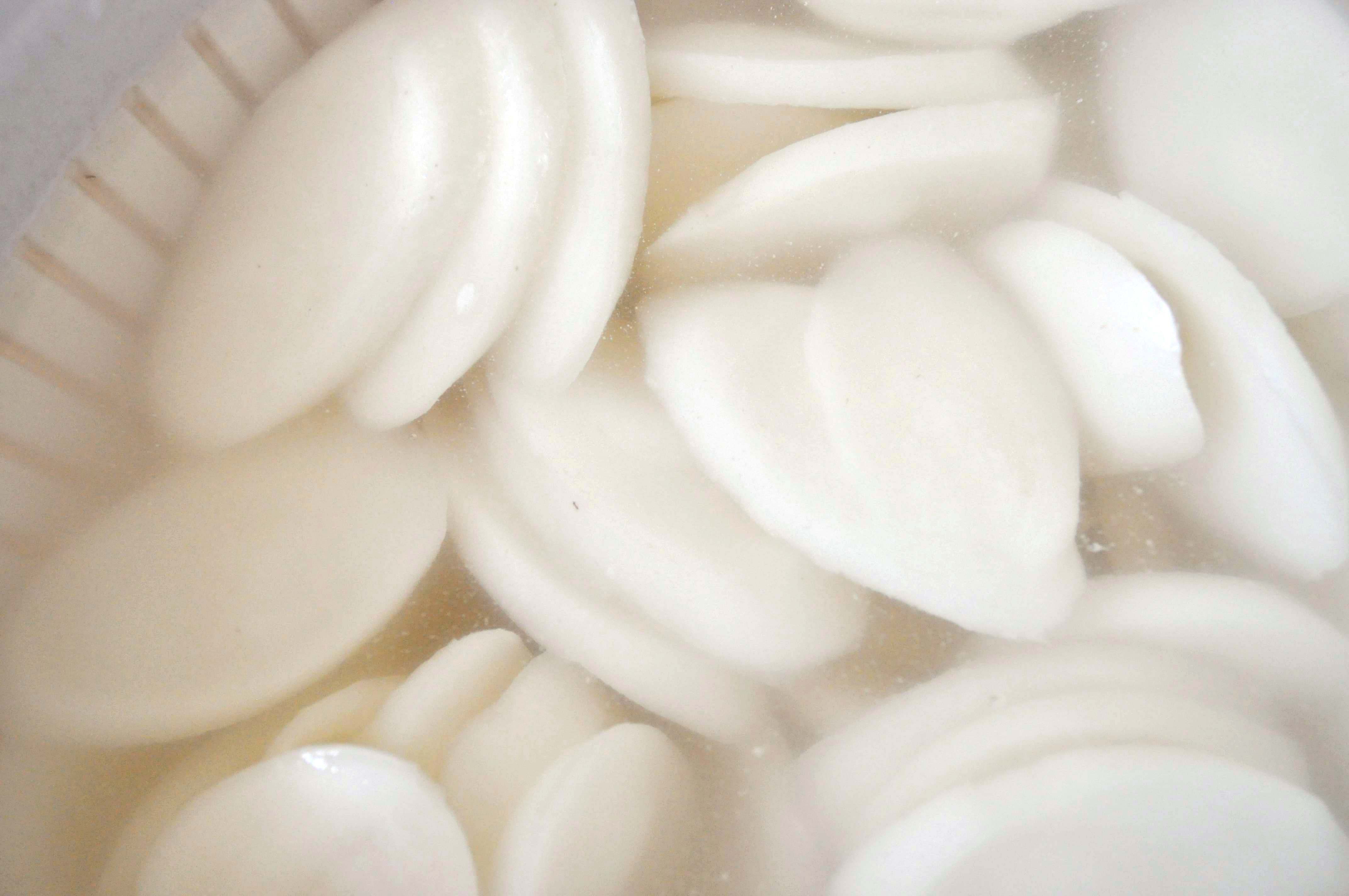
korean rice cake slices(Tteok Guk Tteok) soaking in water
2. The traditional and more formal way is to prepare garnishes with eggs and meat. You can skip the garnish if you want to. But if you are using anchovy stock, I would recommend that you at least make the meat garnish because it adds a lot more flavor to the soup.
First, let’s prepare the egg. This way, you can reuse the frying pan to cook the beef after you cook the eggs. 🙂 Whip 2 eggs in a bowl and season with some salt and pepper. Drizzle some canola oil in a non-stick frying pan and heat on medium-high heat. Pour the egg into the pan and immediately lift the pan off the heat. Swirl the egg around the pan to spread it evenly to make a thin crepe like pancake. Put the pan back onto the heat, lower the heat to medium and when the egg is almost cooked like the picture below, turn it over.
 frying egg for rice cake soup
frying egg for rice cake soupWhen the egg is all cooked, take it out of the pan and let it cool on your cutting board. When it is cool enough to handle, fold it into overlapping thirds (tri-fold). This way, you can cut the strips more uniformly.
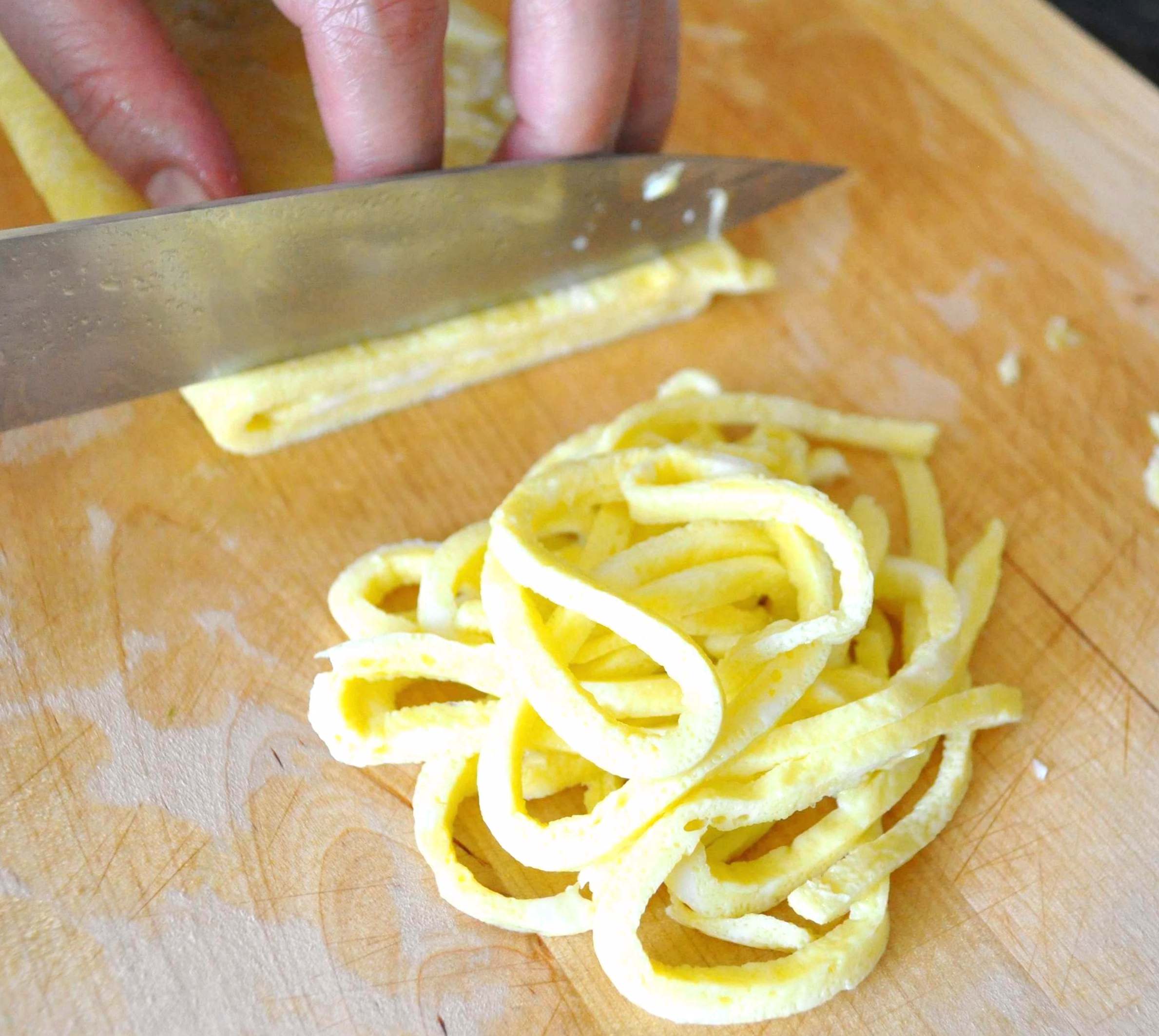 cutting the egg garnish for tteok guk
cutting the egg garnish for tteok gukLet’s prepare the beef. If you are working with a piece of brisket or stew meat, slice the meat into thin strips and season it with soy sauce, sugar, mirin, garlic, pepper and sesame oil. Mix it well.
 marinated beef strips for dduk guk
marinated beef strips for dduk gukYou can also use ground beef instead – this will save you the extra work of slicing the beef. Cook the beef in a frying pan on medium high heat until fully cooked. No need to add any extra oil.
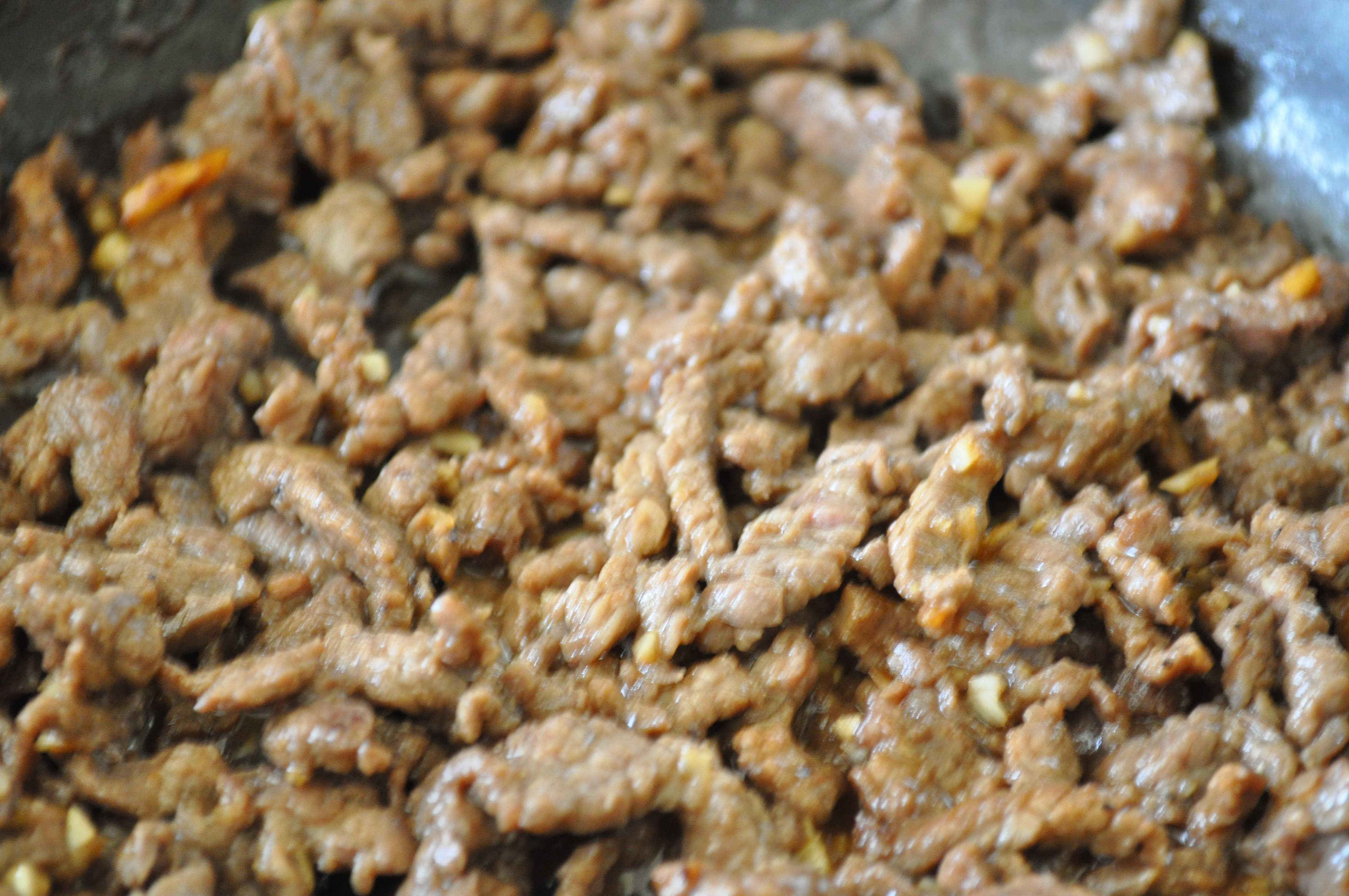 Beef garnish for Tteok Guk (Rice Cake Soup)
Beef garnish for Tteok Guk (Rice Cake Soup)3. Heat the anchovy stock in a pot over medium-high heat. Season the soup by adding salt, Guk Ganjang and chopped garlic. You can also add sliced onions and carrots to the soup to add some color and additional nutrients. Bring to a boil.
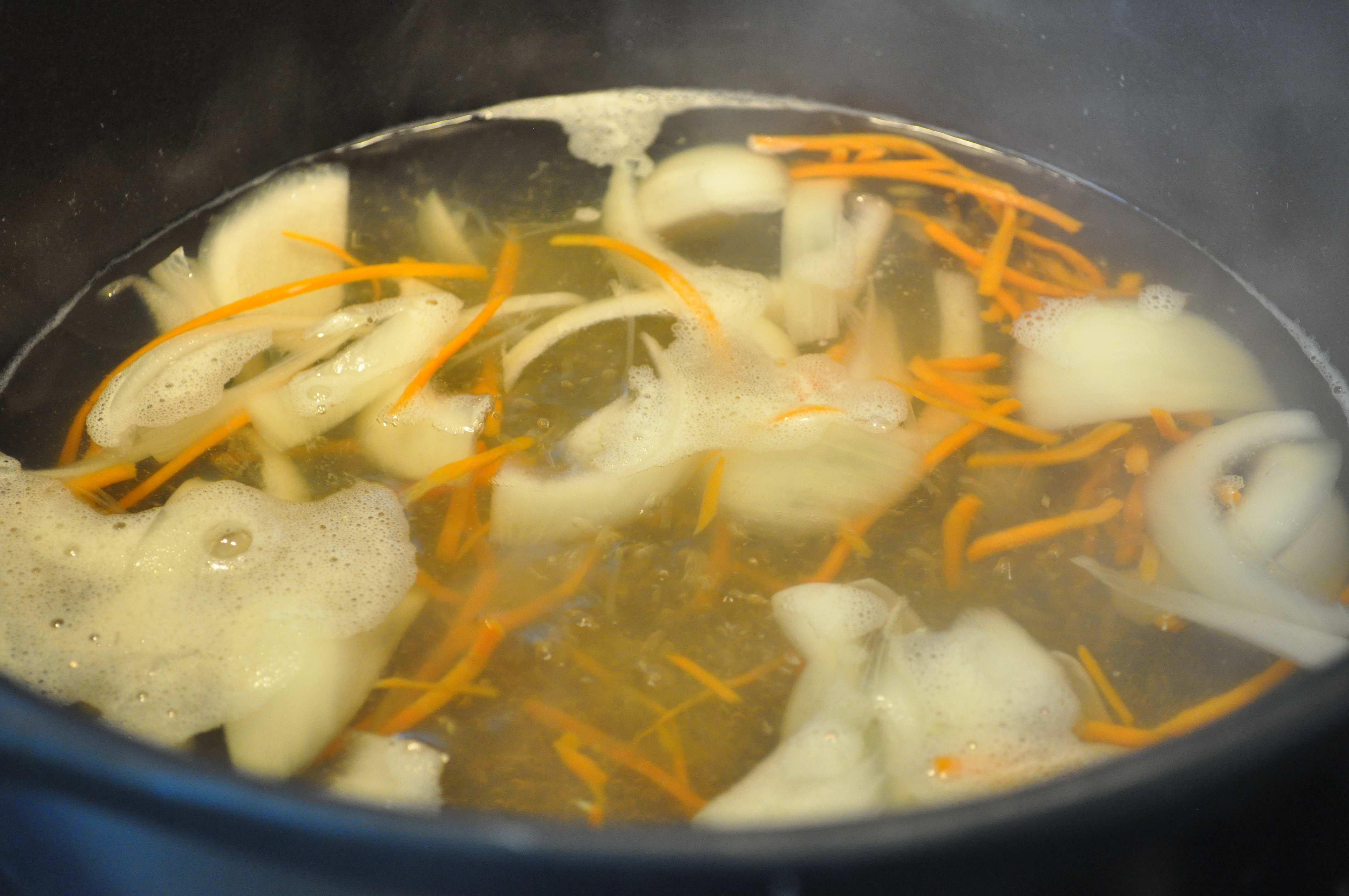 boiling soup stock with onions and carrots added
boiling soup stock with onions and carrots added4. Drain the rice cake slices and add to the boiling soup. Cover the pot and cook for few minutes. When the rice cakes float to the top, they are now cooked and ready to eat. Turn off the heat, sprinkle some black pepper and add sliced green onions.
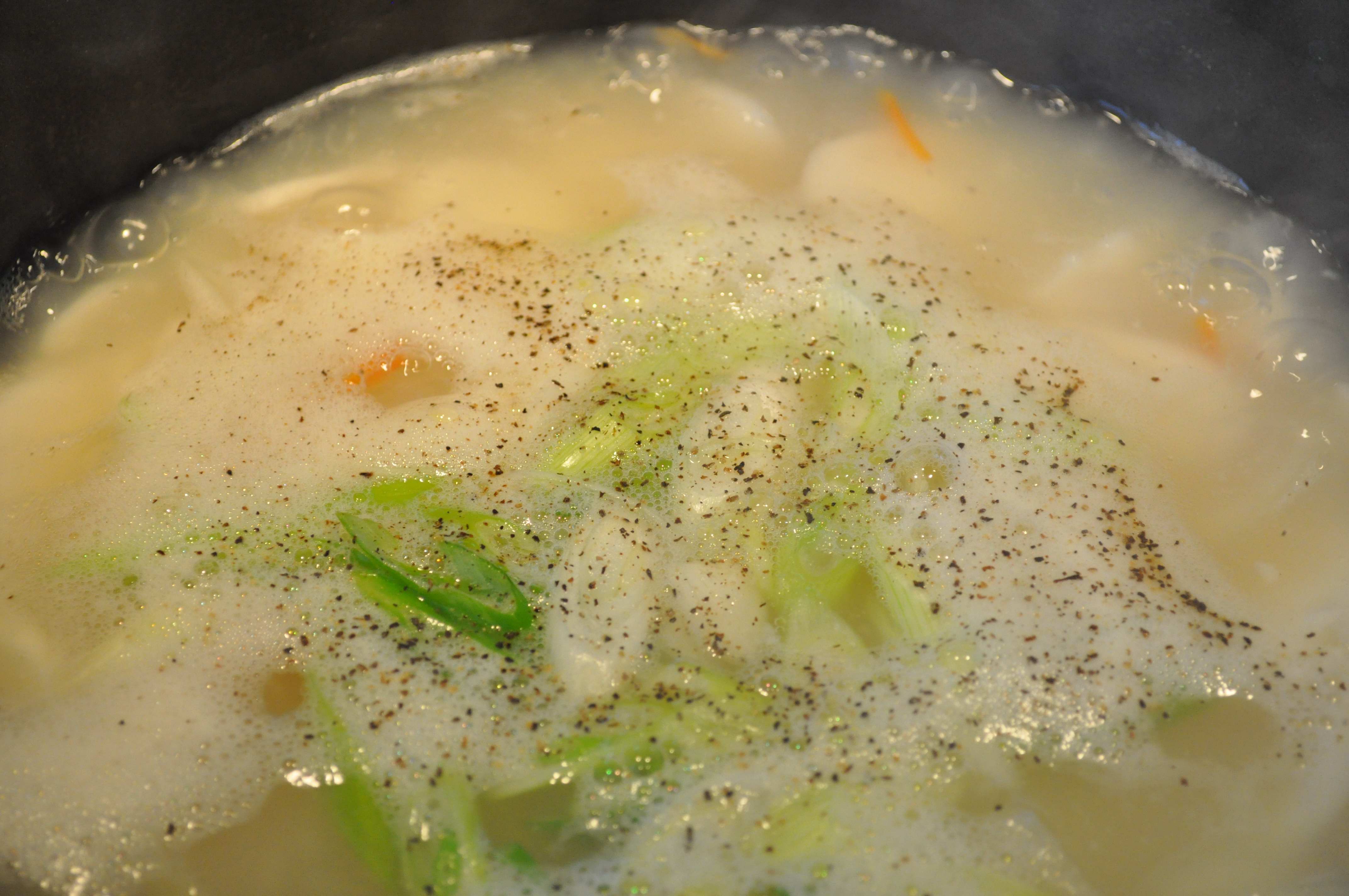
rice cake soup boiling in pot
5. Taste the soup and adjust seasoning if needed. Add more salt if needed. Ladle the rice cake soup into a bowl and garnish with some beef and egg prepared above. Sprinkle some sesame seeds if you’d like and there you go!
Serve with some kimchi, mandoo(dumplings) and hobahk jeon and you have a great comforting meal. Enjoy!
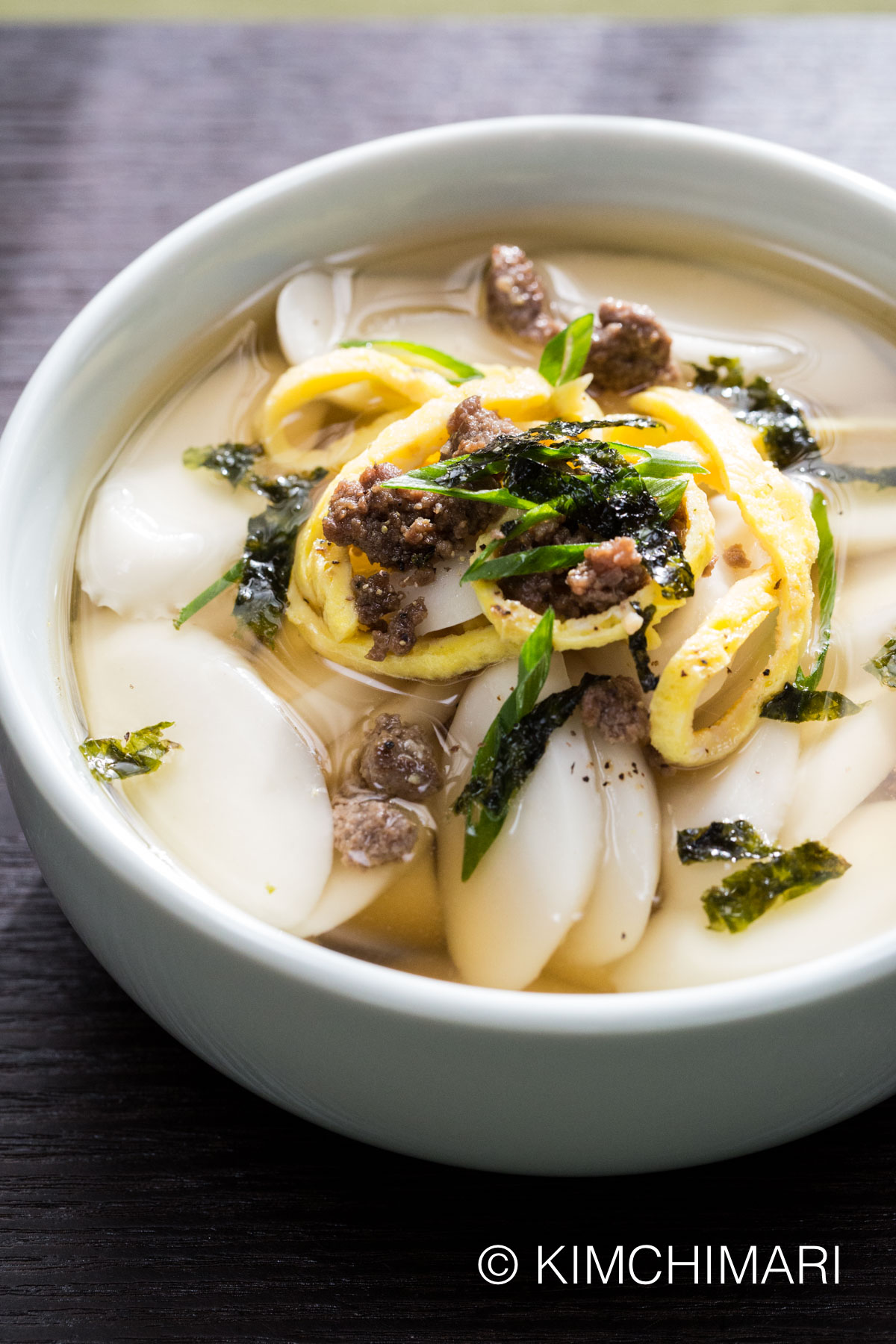
Every New Year’s day, Koreans make Dduk Guk/Tteok Guk and share it with their family and guests who visit their homes. During the New Year holiday, many Koreans travel back to their hometown. You can use chicken stock or beef stock instead of anchovy stock.
Ingredients
▢ 1 lb rice cake slices/ovalettes for soup (떡국떡 Tteok guk tteok)
▢ 8 cup anchovy stock (see my tips page for making anchovy stock)
▢ 2 green onions (sliced thin)
▢ 1/2 sliced onion (optional)
▢ 1 julienned carrot (optional)
▢ 1 Tbsp chopped garlic
▢ 1 Tbsp soup soy sauce (guk ganjang 국간장)
▢ 1/2 tsp salt
▢ black pepper
Toppings
▢ 1 roasted seaweed (gim 김) sheet (crumbled or cut into strips)
Ground Beef
▢ 1/2 lb beef stew meat/brisket or ground beef (optional)
▢ 4 tsp soy sauce (jin ganjang 진간장)
▢ 4 tsp sugar
▢ 1 Tbsp rice cooking wine
▢ 1 Tbsp sesame oil
▢ 1 Tbsp minced garlic
▢ 1/2 tsp ground black pepper
Egg Garnish
▢ 2 eggs
▢ 1 tsp oil for frying
▢ 1 pinch salt
Instructions
- Prepare the anchovy stock - see My Tips page (under Korean Ingredients menu) on how.
- Rinse and soak rice cake in cold water (especially if the rice cake is frozen) for 5 to 10 minutes.
- Whip 2 eggs in a bowl and season with some salt and pepper.
- Drizzle oil in a non-stick frying pan and heat on medium high heat. Pour egg into the pan and immediately lift the pan off the heat. Swirl egg around the pan to spread it evenly to make a thin crepe like pancake. Put the pan back onto the heat, lower the heat to medium and when the egg is almost cooked like the picture below, turn it over.
- When the egg is all cooked, take it out of the pan and let it cool on your cutting board. When it is cool enough to handle, fold it into overlapping thirds (tri-fold). This way, you can cut the strips more uniformly.
- If you are working with a piece of brisket or stew meat, slice the meat into thin strips and season it with soy sauce, sugar, mirin, garlic, pepper and sesame oil. Mix it well.
- You can also use ground beef instead – this will save you the extra work of slicing the beef. Cook the beef in a frying pan on medium high heat until fully cooked. No need to add any extra oil.
- Heat anchovy stock in a pot over medium high heat. Season soup by adding salt, gook kanjang and chopped garlic. You can also add sliced onions and carrots to the soup to add some color and additional nutrients. Bring to a boil.
- Drain rice cake slices and add to the boiling soup. Cover pot and cook for few minutes. When rice cakes float to the top, they are now cooked and ready to eat. Turn off the heat, sprinkle some black pepper and add sliced green onions.
- Taste soup and adjust seasoning if needed. Add more salt if needed. Ladle rice cake soup into a bowl.
- Garnish with beef, egg, green onions and roasted seaweed. Sprinkle some sesame seeds and extra black pepper if you’d like and there you go!
This recipe and image sources are referred in website: Kimchimari.com. Thanks so much!
 Asian Recipes
Asian Recipes



















No comments :
Speak Your Mind: